Feature: Christopher Lock Decodes ‘Ephemerist’
What was the creative process like for this particular album?
This album is largely produced using recordings of my viola playing and heavily processing them to create dense and shifting textures. Many of the samples originate from my live viola and are imbued with character and sonic imperfections. It's these imperfections which help to give the tracks a sense of human presence, sincerity, and emotional vulnerability which I find difficult to evoke using only machines. I recorded most of the raw material for the record over the course of 4 months by improvising for a set time every morning. This regular improvisation became a kind of morning meditation for me where I would clear my mind and play with no creative restrictions. Instead of waking up and looking at social media, I found that this daily creative exercise put me in a far more positive mindset throughout the rest of the day.
Were there any specific recording techniques or equipment used to achieve the desired sound?
My primary production setup for this album consisted of an electric viola, an acoustic viola, Ableton Live, a zoom H6 audio recorder/interface, several mics, and several midi controllers to help mix parameters of the sound live. I used granular synthesis techniques in Ableton Live to break up the viola sounds and diffuse them into textural beds upon which I could layer melodies, harmonies, and glitched out gestures. It was important to me that these tracks don't only have a life as studio recordings but can be performed live as well. I produced the record with the idea of performing the tracks always present in my mind.
Which track(s) from 'Ephemerist' do you think best represents your artistic vision?
‘Ephemerist,’ for me, is partially about my ever changing relationships with memory and the past. Much of the emotionality of the record stems from the pain that some memories can carry and the beauty of realizing that you don't have to hold onto this pain. Instead, you can allow it to guide you as you grow to be a better person, artist, and friend. This is a difficult learning process, one which working on this album helped me to come closer to I think. To me, the tracks which are most heavily saturated with this kind of emotionality are perhaps "Epheme" and "Lightlike". While much of the album has hints and momentary glimpses of this emotional material, these two tracks are perhaps the most vulnerable.
How has studying a PhD made an impact on your music career?
My dissertation focused primarily on the tech behind much of my musical interests, specifically custom software projects which I would create to realize niche and novel musical ideas. I developed my techno-creative practice immensely during my time in school and I look forward to continuing this development after graduation as well.
How do you stay inspired and motivated to continue pushing boundaries in your art?
For much of my life, I have had a picture of my "perfect sound" in my head. It's textural, dark, intense, complex, and dynamic. I have yet to create it after years of attempts. I have come close to feeling satisfied but I can never quite create this platonic ideal sound I have in my mind's ear. So, I will continue trying until I do. I also draw immense energy and creative inspiration from my friends and other electronic musicians working in similar musical idioms. It's very important for my creative health to go out to shows, hear other artists perform live, have conversations and collaborations with other people. This is something that I realized for the first time during the pandemic in 2020, when my access to this kind of inspiration was almost entirely cut off.
